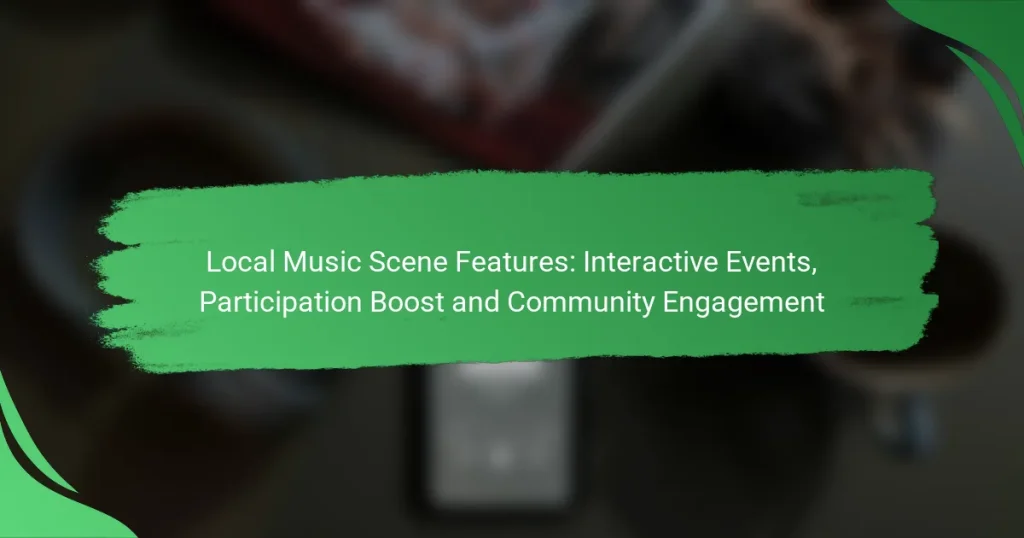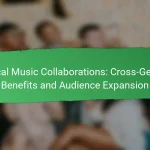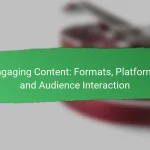The local music scene plays a vital role in enhancing community engagement by uniting residents through interactive events like live performances and workshops. These gatherings not only showcase local talent but also encourage participation, fostering a sense of belonging and strengthening community bonds. By bringing people together, local music events contribute to a vibrant cultural atmosphere and stimulate economic growth within the community.
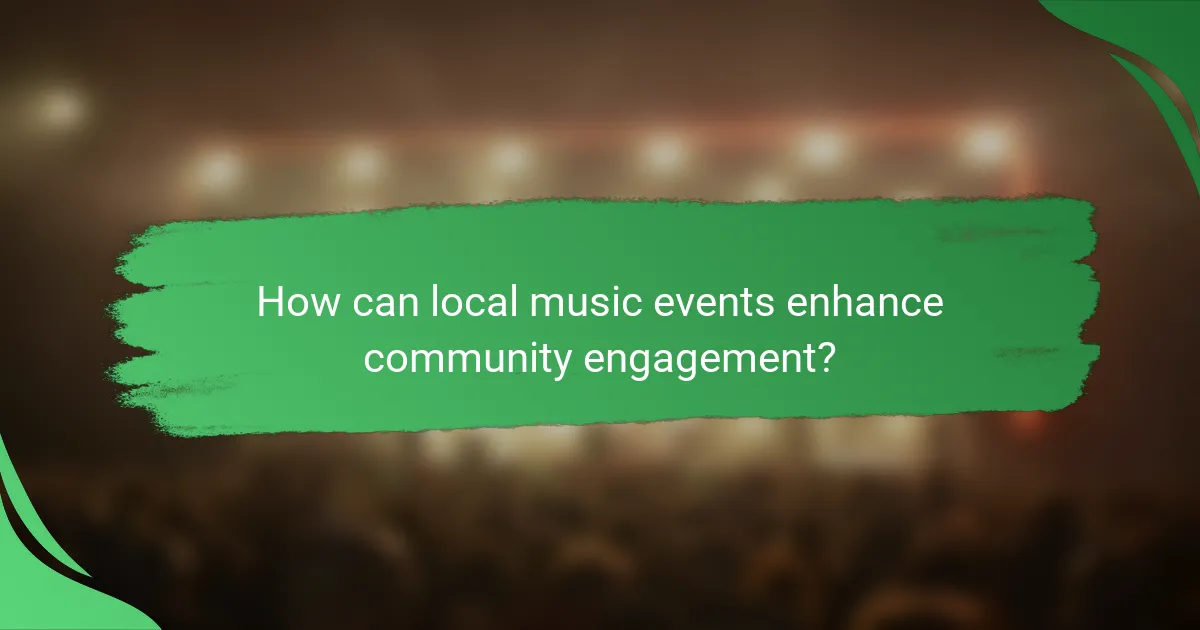
How can local music events enhance community engagement?
Local music events can significantly boost community engagement by bringing people together, fostering connections, and encouraging participation in cultural activities. These events create opportunities for residents to interact, collaborate, and celebrate their shared love for music, ultimately strengthening community bonds.
Increased participation in local festivals
Local music festivals often attract diverse audiences, leading to increased participation from community members. When residents see their friends and neighbors attending, they are more likely to join in, creating a vibrant atmosphere that encourages further involvement.
To maximize participation, organizers can promote festivals through social media, local businesses, and community boards. Offering incentives such as discounted tickets for early registration or family packages can also help draw larger crowds.
Collaboration with local businesses
Local music events provide an excellent platform for collaboration with nearby businesses, which can enhance the overall experience. Businesses can sponsor events, set up booths, or provide food and beverages, creating a win-win situation that benefits both the event and the local economy.
Engaging local businesses not only increases funding for events but also encourages them to promote the festival to their customers, further expanding the reach and impact of the event. Consider forming partnerships with local restaurants, shops, and service providers to create a cohesive community effort.
Creation of music-focused community groups
Music events can inspire the formation of community groups that focus on various aspects of music, such as performance, education, or appreciation. These groups can provide a space for individuals to share their passion, learn from one another, and collaborate on projects.
To establish these groups, interested individuals can host regular meet-ups or workshops, inviting local musicians and enthusiasts to participate. This not only nurtures talent but also fosters a sense of belonging and community pride, as members work together to promote local music initiatives.
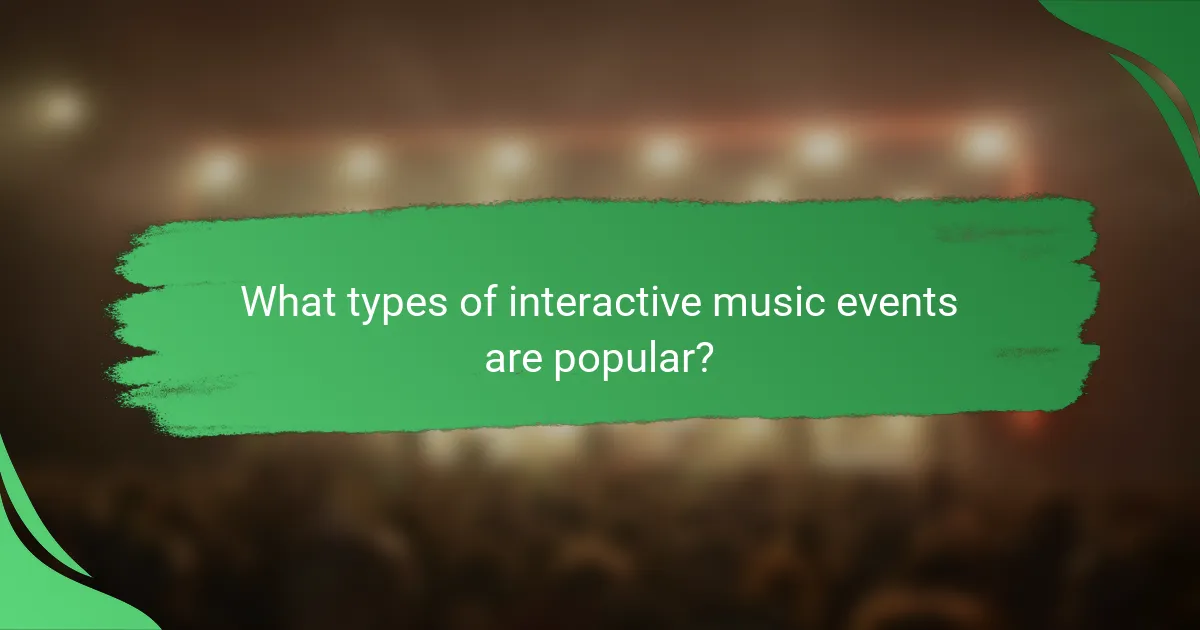
What types of interactive music events are popular?
Interactive music events that engage the community often include live performances, workshops, and open mic nights. These events not only showcase local talent but also encourage participation and foster a sense of belonging among attendees.
Live music performances in public spaces
Live music performances in public spaces, such as parks or town squares, attract diverse audiences and create a vibrant atmosphere. These events are often free or low-cost, making them accessible to everyone. Local musicians can showcase their talents while community members enjoy music in a relaxed setting.
Organizers should consider logistics like sound equipment, permits, and crowd management. Collaborating with local businesses for sponsorship can also enhance the event’s reach and impact.
Music workshops for all ages
Music workshops for all ages provide hands-on experiences that encourage creativity and skill development. These sessions can cover various topics, from instrument playing to songwriting, and are often tailored to different skill levels. Community centers or local music schools frequently host these workshops.
When planning a workshop, consider the duration and materials needed. Offering a range of classes can attract a broader audience, from children to adults, and foster a lifelong appreciation for music.
Open mic nights at local venues
Open mic nights at local venues allow aspiring musicians to perform in front of an audience, creating a supportive environment for artistic expression. These events typically have a sign-up process, where performers can showcase their talent for a few minutes. They are popular in bars, cafes, and community centers.
To ensure a successful open mic night, promote the event through social media and local networks. Setting clear guidelines for performances can help maintain a positive atmosphere and encourage participation from a variety of artists.
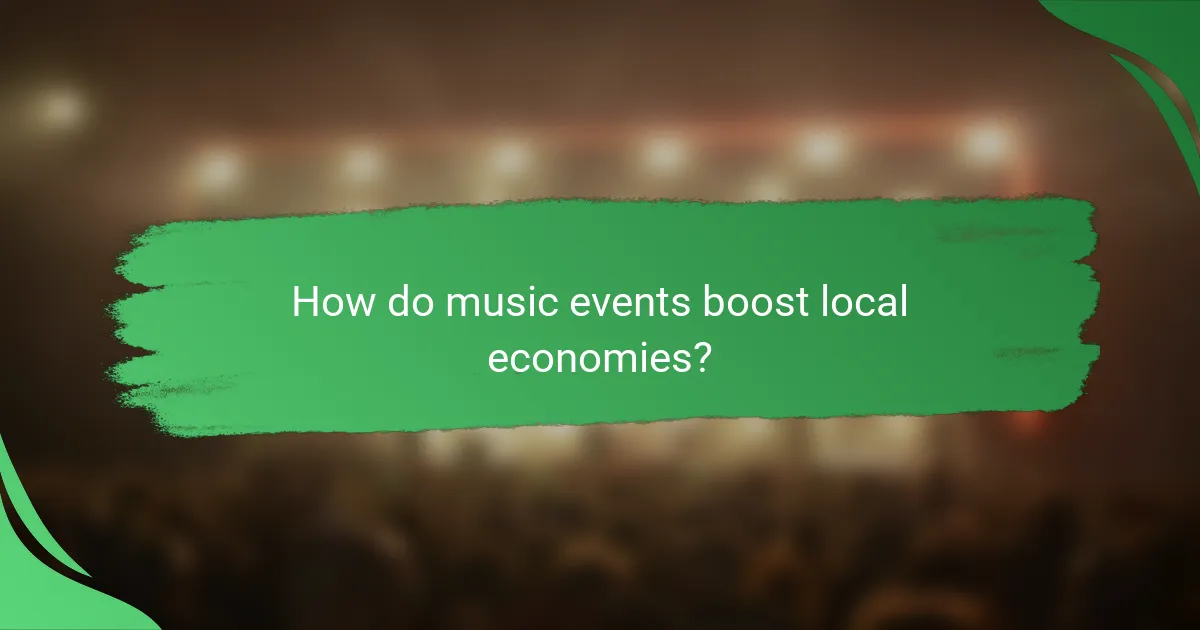
How do music events boost local economies?
Music events significantly enhance local economies by attracting visitors, generating revenue, and fostering community engagement. These gatherings create opportunities for local businesses and artists, ultimately leading to a more vibrant economic landscape.
Attracting tourism through music festivals
Music festivals serve as major attractions for tourists, drawing attendees from various regions. These events often showcase local culture, cuisine, and talent, making them appealing to visitors looking for unique experiences.
For example, a weekend music festival can attract thousands of attendees, resulting in increased bookings for local hotels, restaurants, and attractions. This influx of tourists can lead to substantial economic benefits for the area.
Supporting local artists and vendors
Local music events provide a platform for artists and vendors to showcase their work, helping them gain visibility and build a following. By featuring local talent, these events foster a sense of community and pride.
Additionally, vendors selling food, crafts, and merchandise at these events can see significant sales boosts. This support helps sustain local businesses and encourages the growth of the creative economy.
Increasing foot traffic to local businesses
Music events can dramatically increase foot traffic in the surrounding areas, benefiting local shops and restaurants. When attendees come for the music, they often explore nearby businesses, leading to higher sales.
For instance, a concert in a downtown area can lead to a noticeable uptick in customers for cafes and stores, especially before and after the event. Local businesses can capitalize on this by offering promotions or special deals during music events to attract more customers.
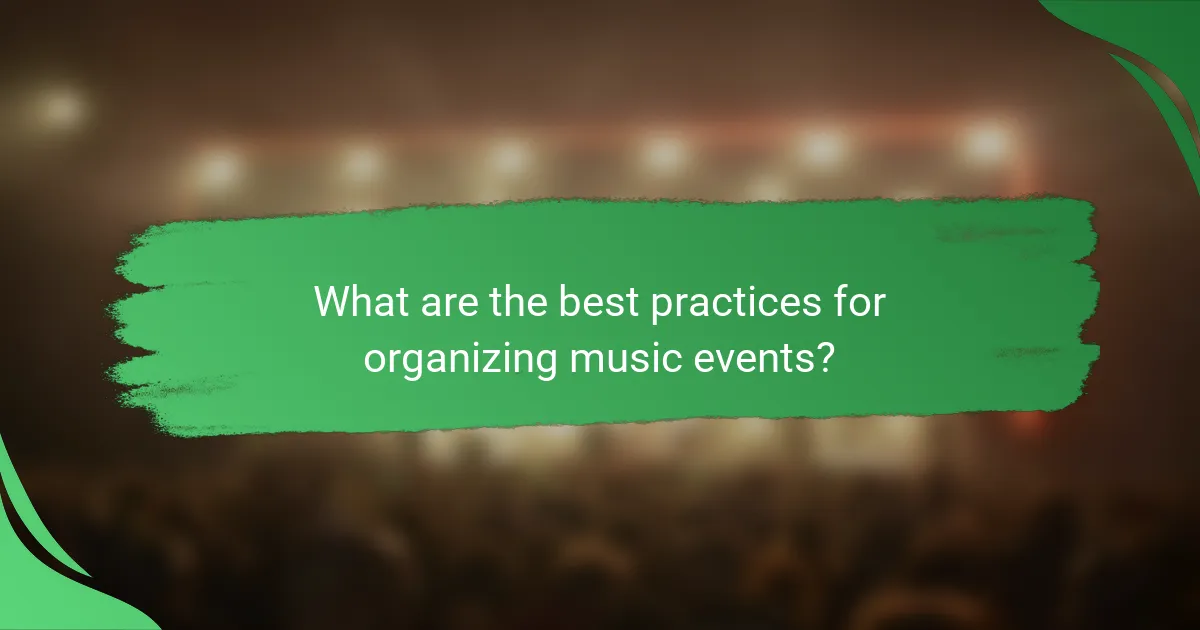
What are the best practices for organizing music events?
To successfully organize music events, focus on community involvement, effective promotion, and accessibility. These practices enhance participation and foster a vibrant local music scene.
Engaging with local artists and musicians
Building relationships with local artists is crucial for creating authentic music events. Collaborate with musicians from various genres to reflect the community’s diversity and attract a wider audience.
Consider hosting open mic nights or jam sessions to encourage participation from emerging talent. This not only showcases local artists but also creates a sense of ownership among community members.
Utilizing social media for promotion
Social media platforms are powerful tools for promoting music events. Use channels like Facebook, Instagram, and Twitter to share event details, artist line-ups, and engaging content that resonates with your audience.
Creating event pages and utilizing targeted ads can significantly increase visibility. Encourage attendees to share the event on their profiles to expand reach organically.
Ensuring accessibility for all community members
Accessibility is essential for inclusive music events. Ensure venues are wheelchair accessible and provide necessary accommodations for individuals with disabilities, such as sign language interpreters or sensory-friendly spaces.
Consider offering ticket pricing options to accommodate different budgets, including free or low-cost entry for community members. This approach fosters a welcoming environment for everyone to enjoy the music.
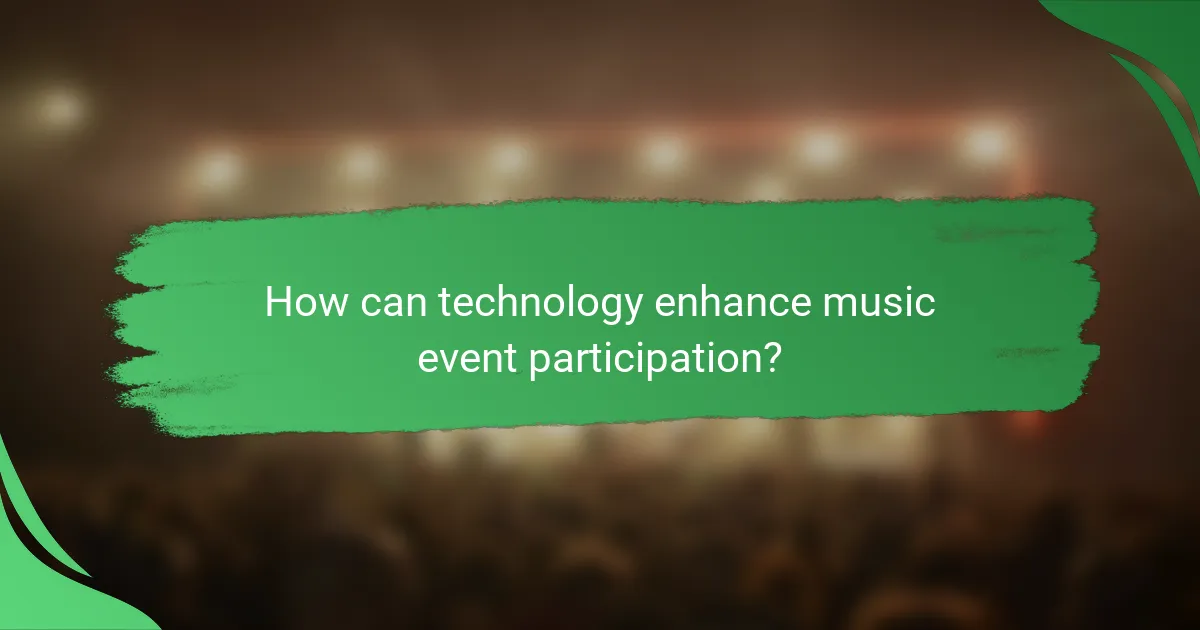
How can technology enhance music event participation?
Technology can significantly boost music event participation by providing tools that facilitate engagement and streamline communication. By utilizing apps, virtual options, and social media, organizers can create a more interactive experience that encourages audience involvement.
Using event apps for real-time updates
Event apps are essential for delivering real-time updates to attendees. These applications can provide notifications about schedule changes, artist lineups, and venue information, ensuring that participants stay informed throughout the event.
To maximize effectiveness, choose an app that allows for push notifications and integrates with social media. This way, attendees can receive instant alerts and share their experiences, further enhancing engagement.
Implementing virtual attendance options
Offering virtual attendance options can broaden participation beyond those physically present. Live streaming performances or creating virtual meet-and-greets allows fans who cannot attend in person to engage with the event.
Consider using platforms that support high-quality streaming and interactive features like chat rooms or Q&A sessions. This approach not only increases reach but also fosters a sense of community among both in-person and virtual attendees.
Leveraging social media for audience interaction
Social media is a powerful tool for enhancing audience interaction before, during, and after music events. By creating dedicated event hashtags and encouraging attendees to share their experiences, organizers can generate buzz and foster community engagement.
Utilize platforms like Instagram and Twitter for live updates, polls, and contests. Engaging with the audience through comments and shares can significantly enhance their connection to the event and encourage future participation.
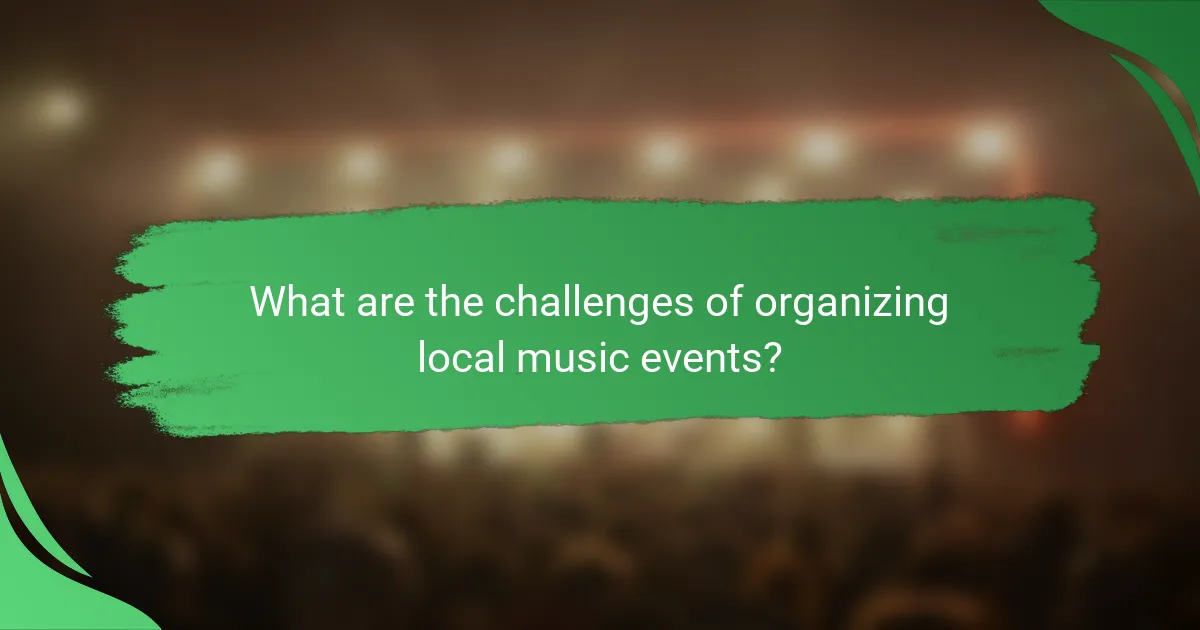
What are the challenges of organizing local music events?
Organizing local music events involves several challenges, including securing funding, managing logistics, and obtaining necessary permits. These factors can significantly impact the success and sustainability of the event.
Securing funding and sponsorships
Funding is often one of the biggest hurdles in organizing local music events. Event organizers typically rely on a mix of ticket sales, sponsorships, and grants to cover costs. It’s essential to create a compelling proposal that outlines the event’s benefits to potential sponsors, such as brand visibility and community engagement.
Consider approaching local businesses for sponsorships, as they may be more inclined to support events that promote community involvement. Offering tiered sponsorship packages can also attract a wider range of sponsors, from small businesses to larger corporations.
Managing logistics and permits
Logistics encompass a variety of tasks, including venue selection, sound equipment rental, and scheduling. Each of these elements requires careful planning to ensure a smooth event. Start by researching local venues that are suitable for your audience size and type of music.
Permits are another critical aspect of event management. Depending on the location, you may need to secure permits for noise, alcohol sales, and public gatherings. Check with local authorities well in advance to understand the requirements and avoid last-minute complications.
